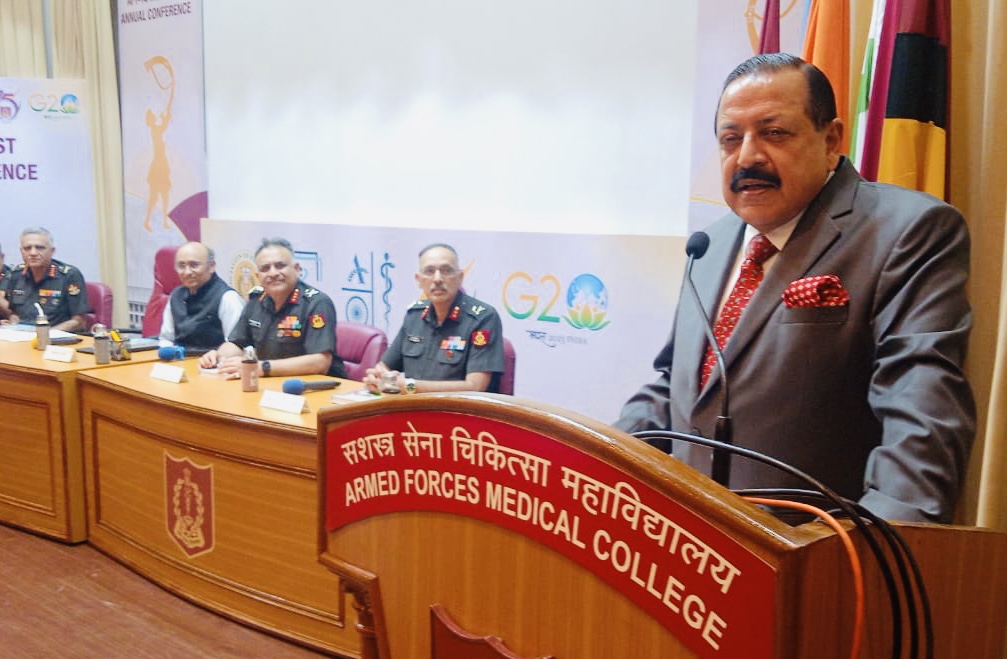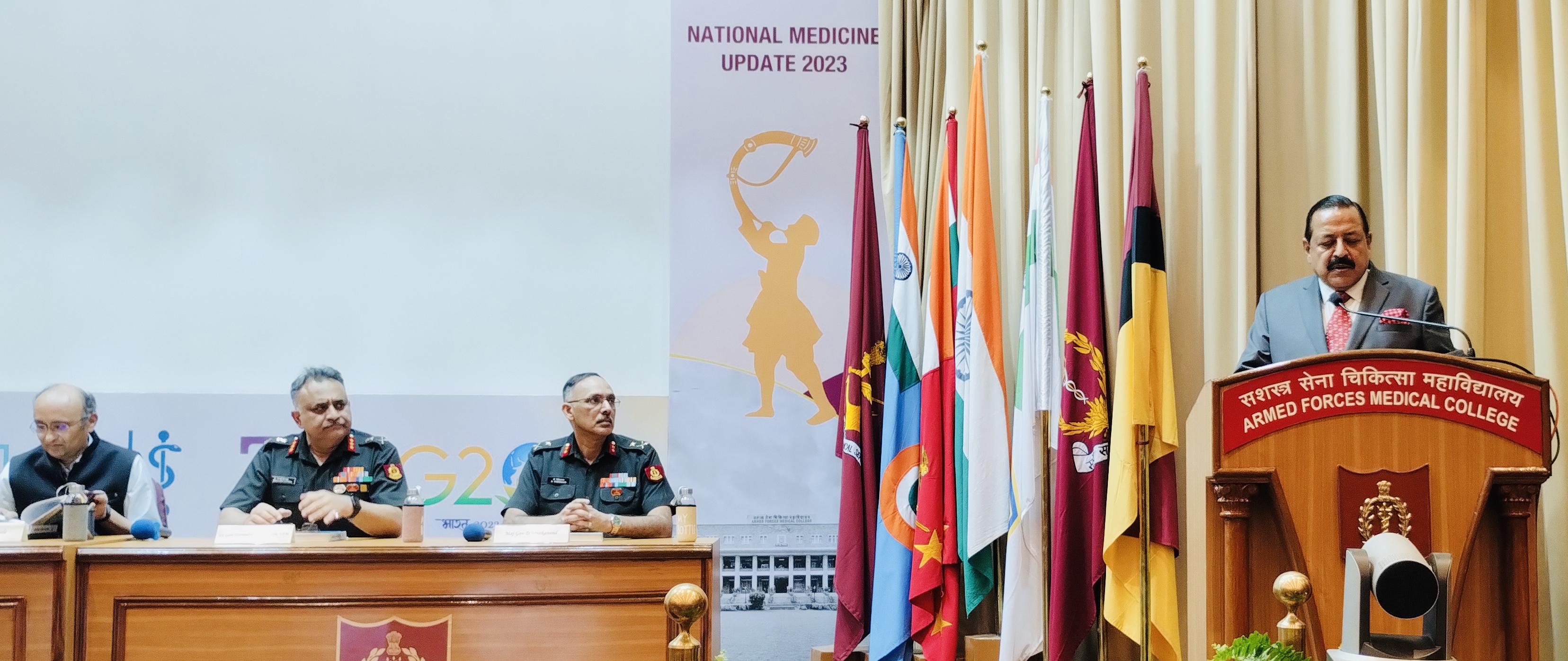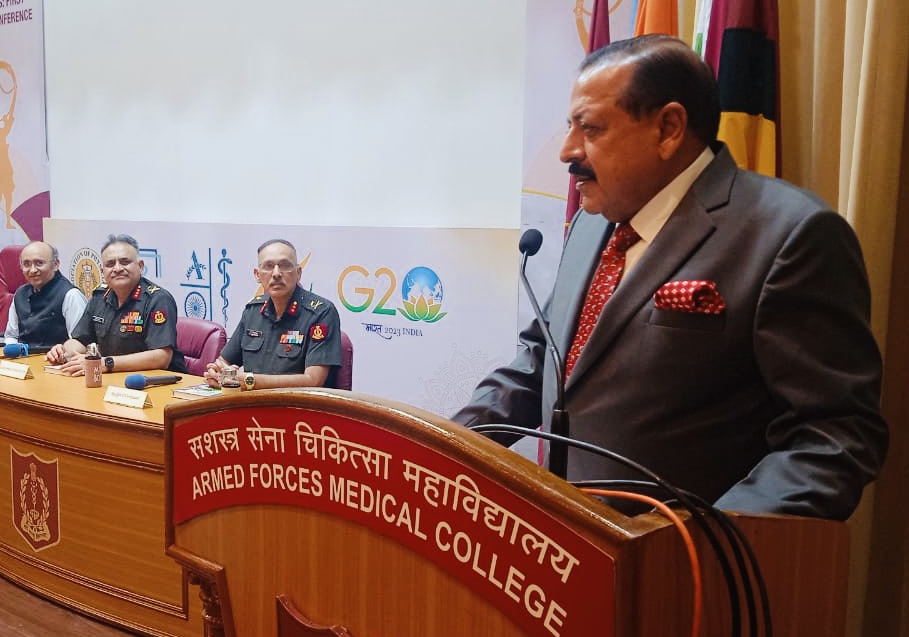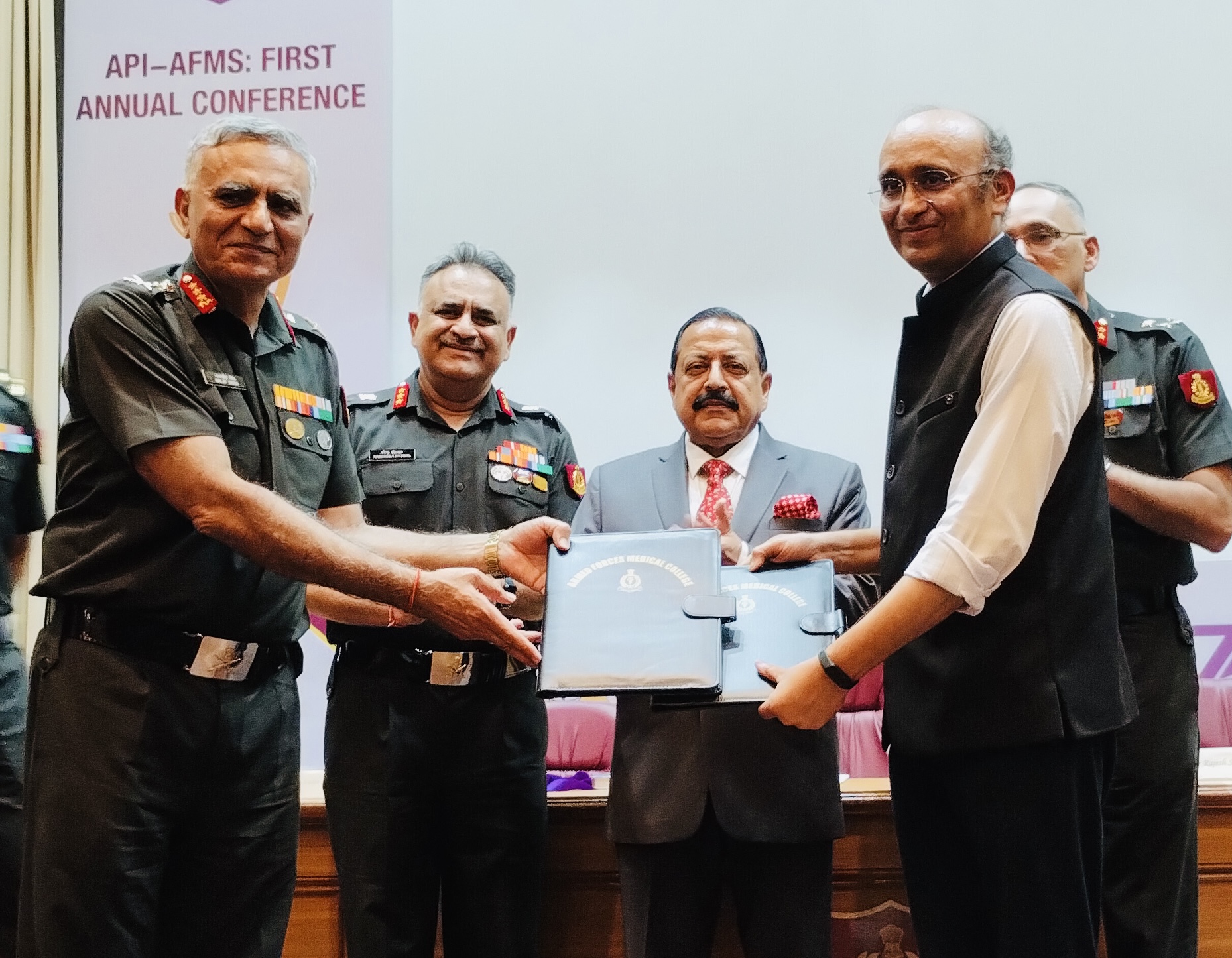Dr Jitendra Singh launches the Association of Physicians of India (API) Chapter of AFMC, Pune
As part of the year-long platinum jubilee celebrations of Armed Forces Medical College (AFMC), Pune, the Union Minister of State (Independent Charge) Science & Technology; MoS PMO, Personnel, Public Grievances, Pensions, Space and Atomic Energy, Dr Jitendra Singh today launched the Association of Physicians of India (API) Chapter of AFMC, Pune and also inaugurated the first annual conference of API-AFMS Continuing Medical Education (CME) on “Emerging trends in the practice of Medicine”.
Describing AFMC, Pune as the first Central Government institute of Medical Education established much before the AIIMS, Delhi came into being, Dr Jitendra Singh said the idea of a separate AFMC came from none other than Dr BC Roy, who is also credited with nurturing the API.
“As a common legacy, the coming together of API and AFMC also has a historical value and marks a befitting tribute to the first-generation physician, Dr BC Roy,” he said.
In his Inaugural address at the Conference, Dr Jitendra Singh said the age of working in silos is over and during the nine years of governance under Prime Minister Shri Narendra Modi, conscious efforts have been made to integrate different organs of the Government including Ministries and departments with various associations, institutes of higher and specialized learning and the Industry, particularly in the Healthcare sector.

Dr Jitendra Singh, who is himself a distinguished Diabetologist and Professor of Medicine, said new tools of diagnosis and therapeutic medicine require holistic and “Whole of Science” approach for desired optimum results.
Thanking PM Modi for bringing ‘Preventive Healthcare’ into focus in the country for the first time, Dr Jitendra Singh said, in a country with 70% population below the age of 40 and the youth of today are going to be the prime citizens of India@2047.
“Preventive healthcare and widespread mass screening will help India attain the status of a Developed Economy. The whole world recognised India’s leadership role during COVID-19, as it achieved the rare feat of delivering over 220 crore vaccinations through a fully digital platform – COWIN and the process continues. Under the leadership of PM Modi, in just a span of two years, India could produce two DNA vaccines and one nasal vaccine,” he said.

Dr Jitendra Singh said there has been a transition over the entire disease spectrum as well as the evolution of therapeutic and the preventive modalities available to us over the last half a century or so.
“After the Eighties, there was globalization or the so-called ‘democratization’ of diseases, so we also started having the lifestyle diseases, coronary diseases, etc, and coupled with that also the change in life expectancy,” he said, pointing out that the life expectancy has gone up close to 70 years of age.
With the same objective, said Dr Jitendra Singh, the Department of Biotechnology (DBT), Ministry of Science and Technology today signed an MoU with Armed Forces Medical Services (AFMS), Ministry of Defence. The MOU envisages to build research collaborations in Biomedical sciences and also promote scientific cooperation through faculty exchange programmes.

The MoU was signed during a brief ceremony at the Armed Forces Medical College in Pune by Dr. Rajesh S Gokhale, Secretary, DBT and Lt Gen Daljit Singh, DGAFMS in the presence of Dr Jitendra Singh.
“The MoU will help in pioneering new research in areas like Genomics, which have a bearing on Lifestyle Diseases and emerging diseases like Malignant Cancer,” he said.
Congratulating DBT and AFMS for coming together for signing this MOU on Inter-Ministerial Cooperation for Collaborative Research and Training, Dr Jitendra Singh said that Biotech applications are diverse and critical to ensuring the health, safety and performance of Military personnel.
“DBT has made significant contributions in the Biomedical sector especially in the development of advanced diagnostics, therapeutics and Vaccines and is engaged in cutting edge research to support our health systems,” he said.
Dr Jitendra Singh said, the MoU is yet another step towards the “Whole of Government” vision as laid down by the Prime Minister Shri Narendra Modi through integration of schemes and ideas, breaking silos between Ministries and Departments.
“Biotechnology will be the key to Amrit Kaal economy and also for making India a frontline nation in the world. Biotechnology Sector has seen a rapid growth in the last 9 years and India is now being rated among top 12 biotechnology destinations in the world. Similarly, in the last 9 years from 52 odd startups in 2014, we now have more than 6,000 Biotech Startups,” he said.
The S&T Minister said the DBT, through BIRAC (Biotechnology Industry Research Assistance Council) and its various schemes and initiatives, encourages startups, entrepreneurs, innovators, scientists, technology experts, academicians to undertake translational research and innovations leading to development of affordable products & technologies for public at large. BIRAC schemes encourage setting up of biotech enterprises. Support is extended for mentoring, funding, validation/pilot testing of startup innovations and investor connect for the startups in biotechnology domain.
“The progress made through BIRACs incubation program include setting up of 75 Incubation Centres supported through BIRAC’s BioNEST and E-YUVA (Empowering Youth for Undertaking Value Added Innovative Translational Research) schemes of BIRAC across 21 States & UTs of the country, besides around 900 innovative projects supported under Biotech Ignition Grant (BIG),” he said.

Speaking on the occasion, Dr. Rajesh S Gokhale, Secretary, DBT said that the big data pertaining to microbiome and genome can be leveraged towards precision health and precision nutrition for our forces.
“In this context, the facilities and expertise offered by Indian Biological Data Center established by the DBT in the Regional Center for Biotechnology (RCB), Faridabad could be utilized for collaboration in big data analytics for the health sector,” he said.
The proposed collaboration is on the following verticals:
(a) Collaborative biomedical research: To explore opportunities of undertaking joint research projects to be funded by DBT and will work together for the purpose of identifying the needs of the country in terms of research and technology and collaborate in the identified areas.
(b) Faculty exchange programme: The two parties will explore opportunities for interaction among members of faculty between DBT and AFMS institutions as well as for possibility of Visiting Faculty arrangements.
(c) Joint Academic Activities and Events: DBT and AFMS will formulate joint academic activities such as short courses, seminars, workshops and conferences based on mutual interests and available expertise in the institutions.

